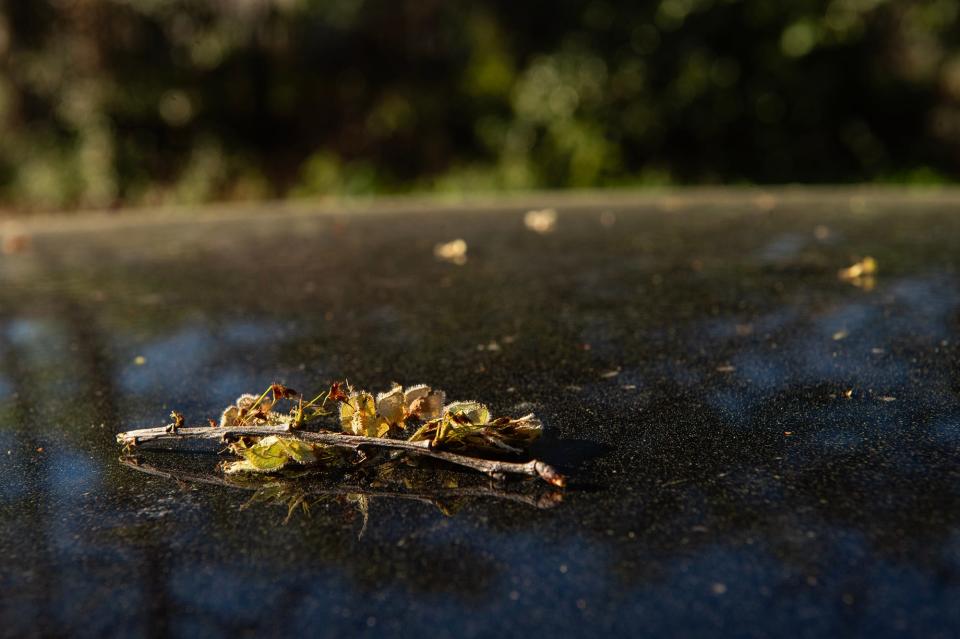Spring allergies in Mississippi: What to expect this year, according to experts
For people who suffer from seasonal allergies — about one third of Americans — the beginning of spring is marked with the return of runny noses, sneezing and itchy eyes.
In Mississippi, the spring allergy season has already begun — and it may be worse this year than in recent years.
Because they are so common, seasonal allergies may not seem like a big deal. However, the symptoms can greatly affect quality of life.
Gailen Marshall, chair of the Allergy and Immunology Department at the University of Mississippi Medical Center, sees this issue in patients often.
"Nobody dies of hay fever, but people that have really severe hay fever may feel like dying sometimes because they're so miserable during the season," Marshall said.

The root of spring allergies
Thick, yellow pollen particles coating vehicles is a familiar sight in the morning in Mississippi. That pollen is most likely from pine trees, Marshall said, and the particles are actually not as likely to cause severe symptoms as some other particles.
The particles that do cause more severe symptoms are smaller and harder to see with the naked eye, Marshall said. That type of pollen comes from trees such as oaks, maples and birch. Because of their smaller size, those pollen particles can sneak into the nasal canal more easily.
The typical spring allergy season in Mississippi — at least for tree allergies — typically lasts from early March to May, he said. After that, the grass allergy season begins.
Spring allergies are exacerbated by rain patterns seen in Mississippi. Often, in the spring months, there is a pattern of a few days of heavy rainfall followed by a few days of clear weather and so on.
Most people relish those clear days in between, and some people might think those days will bring less allergy symptoms since the previous days' rain washes the pollen away. In actuality, according to Marshall, those conditions allow the naturally occurring mold in soil to thrive. This mold, which is also the root of that earthy smell associated with dirt, can cause common allergy symptoms.
"(People with allergies) get relief from the pollens if it rains, but then the mold spores can come in, replace that, and it can actually keep them miserable for the whole season," Marshall said.

Mississippi expects rough allergy season this year
As Mississippi blooms into spring, the state is moving away from a "wet winter," Marshall said. This wet winter replaces a water deficit from last year's drought.
The excess water combined with the effects from the drought means spring 2024 will be a robust allergy season for Mississippians, Marshall said.
Mississippians can expect increased cases of "hay fever," a name colloquially given to allergy symptoms, he said. Hay fever does not actually come with a fever, but does include common allergy symptoms like sneezing and itching in the eyes, nose, back of throat and even in the ears.
If you experience those symptoms along with soreness in the throat or a fever, the combination is most likely indicative of a cold, which should be treated differently from allergies, Marshall advises.
More: Architecture firm breathes new life into these three MS Rosenwald Schools. Read more here

Prevention and treatment: what to know
Marshall encouraged Mississippians to follow the motto, "sooner is better than later."
In other words, you don't have to wait until your nose starts running to treat symptoms.
"As the wind blows nicely, it starts to make you sneeze and your nose starts to itch," Marshall said. "As soon as you recognize that, the sooner you start your medicine, the better you're going to respond."
Over-the-counter antihistamines and nasal sprays are the two ways people commonly treat allergy symptoms. Both of those options are good preventative measures, Marshall said, but each have caveats to consider.
Antihistamines must be considered carefully as different over-the-counter options come with side effects. For example commonly used brands such as Clariton and Allegra are non-sedative options while others like Zyrtec may cause some sedation. Sedation is particularly dangerous in older Mississippians who may have balance issues or other fall risks.
Nasal sprays, including those with steroids, typically have less side effects than antihistamines when used daily. Those sprays take longer to work, however, Marshall said. Sprays must be used consistently every day for about two weeks before they begin to work. Daily use throughout the allergy season is key to the spray's effectiveness.
If symptoms persist through those two methods of treatments, Marshall said it may be worthwhile to visit a board-certified allergist immunologist who can offer additional treatments such as allergy shots.
More: Operation Shoestring receives $2 million investment. See how it will be used
Seniors need extra precautions
Mississippians over the age of 65 need to take extra precautions when it comes to seasonal allergies, Marshall said. Many senior citizens don't consider the fact that with age comes a weakening of the immune system, meaning common allergies pose a greater risk.
Lara Clement, family medicine specialist at CenterWell Senior Primary Care in Jackson, said vulnerability is heightened in seniors.
"In fact, 5% to 10% of Americans who are over the age of 65 live with chronic allergies," Clement said. "And here in the South, we do experience more of that, at least in terms of the specific allergens that are out. This is certainly a time of year where you're seeing all the weeds blooming on the side of the interstate."
Many older Mississippians may get a cough or a persistent sneeze and write it off as a mild cold that will go away on its own. Actually, allergy symptoms can easily exacerbate a more serious underlying health issue, Clement said.
"As older Mississippians, they need to realize that their allergy symptoms may be the sign of something that is going to be worse," Clement said. "It may actually be that they're showing signs of asthma. They may never have been diagnosed with asthma before."
Clement offered the following advice for older Mississippians and those with chronic health conditions:
Talk to your regular health care provider about any symptoms like sneezing, running nose or cough.
Place an air purifier in frequently used rooms of the house.
Keep windows closed on days with high pollen counts.
Consider changing clothes and showering after spending time outside to prevent allergens from spreading within your home.
If you plan to use over-the-counter antihistamines, consult with your health care provider first to ensure the medications do not have an adverse reaction with other regularly-taken medications. Over-the-counter antihistamines, when combined with other medications, may cause sedation, dry mouth, urinary issues and other side effects.
Got a news tip? Contact Mary Boyte at [email protected]
This article originally appeared on Mississippi Clarion Ledger: Spring allergies expected worse this year in Mississippi, experts say
